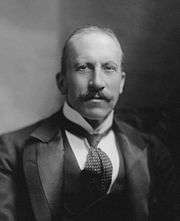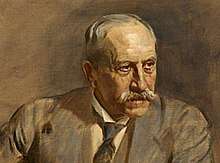
Alfred Milner, early 1900's
Alfred Milner KG GCB GCMG PC (23 March 1854 – 13 May 1925) was a British statesman and colonial administrator.
Quotes
- There is only one possible settlement – war! It has got to come ... The difficulty is in the occasion and not the job itself, that is very easily done and I think nothing of the bogies and difficulties of settling South Africa afterwards. You will find a very different tone and temper when the center of unrest is dealt with.
- — Milner as recorded by Percy FitzPatrick, cited in Diamonds, Gold, and War: The British, the Boers, and the Making of South Africa, 2008, Martin Meredith, p. 374.
- If, ten years hence, there are three men of British race to two of Dutch, the country [i.e. South Africa] will be safe and prosperous.
- — Milner on 27 December 1900, in private correspondence with Major Hanbury-Williams, as quoted by C. Headlam in The Milner Papers: South Africa, 1933, Cassell, p. 242
- ...the impracticability of governing natives, who, at best, are children, needing and appreciating just paternal government, on the same principles as apply to the government of full-grown men.
- — Milner on 6 December 1901, on post-war government in South Africa, in correspondence with Joseph Chamberlain, as quoted by C. Headlam in The Milner Papers: South Africa, 1933, Cassell, p. 312
- If we believe a thing to be bad, and if we have a right to prevent it, it is our duty to try to prevent it and damn the consequences.
- — Milner in 1909 on Lloyd George's "People's Budget", presented to Parliament.
- I feel more sure that the end is nearing than I do what kind of end it will be.
- — Milner commenting to Arthur Glazebrook of Canada, about the United States' late entry in the war, cited in J. Lee Thompson's book Forgotten Patriot, 2007, Rosemont, p. 338.
- The prospects for peace were, "even blacker than a year ago".
- — Quoted on March 23, 1919, one year after Lloyd George called and asked him to go to France to find out the position of the British Army after the German surprise attack. From Forgotten Patriot, 2007, Rosemont, p. 359.
- Instead of it (World War I) having been a war to end wars - it (the Paris Peace Conference) is a Peace to end Peace.
- — A remark to his private secretary, Lord Sandon, in May 1919. From Terence H. O'Brien, Milner, Viscount Milner of St James and Cape Town 1954-1925, 1979, Constable, p. 335.
Quotes about Milner

Milner is a tired, dyspeptic old man. ~ Sir William Robertson
- ...trained in the school of newspapers and books rather than that of men. ...poor nervous ignorant fellow, utterly out of sympathy with South Africa.
- — John Merriman cited in Diamonds, Gold, and War: The British, the Boers, and the Making of South Africa, 2008, Martin Meredith, p. 368.
- In appearance a scholar rather than a man of action, but with an air of grave assurance, which indicated fixity of purpose, a man more apt to give than to take advice.
- — James Rose Innes cited in Diamonds, Gold, and War: The British, the Boers, and the Making of South Africa, 2008, Martin Meredith, p. 368, his first impression of Milner at Government House, Cape Town
- I think that Milner and I stand for very much the same things. He is a poor man, and so am I. He does not represent the landed or capitalist classes any more than I do. He is keen on social reform, and so am I.
- — David Lloyd George, quoted in Lord Riddell's diary entry (18 February 1917), J. M. McEwen (ed.), The Riddell Diaries 1908-1923 (London: The Athlone Press, 1986), p. 186.
- The interview adjourned at an appointed hour to the office of the Secretary of War, Lord Milner, whose little book on "The English in Egypt" written twenty-six years ago, was a bible to me in Philippine days. He was an extremely forceful and able man. He was born in Germany of British parents and seems to have acquired a little of the blood and iron. At least he is the most difficult person to bring over that my General (Pershing) and I have attempted. It is all on the question of how many troops shall go with the British and what they shall be. He wants all infantry and machine guns, and while protesting that they all look forward to the day when we shall have our American Army on the line as such, is demanding the things that will make that impossible, at least before 1919.
- — Major General James Harbord, quoted in Leaves From a War Diary (New York: Dodd, Mead & Company: 1925), pgs. 270-271.
- Lord Milner has gone from South Africa, probably forever. The public service knows him no more. Having exercised great authority he now exercises no authority. Having held high employment he now has no employment. Having disposed of events which have shaped the course of history, he is now unable to deflect in the smallest degree the policy of the day. Having been for many years, or at least for many months, the arbiter of the fortunes of men who are 'rich beyond the dreams of avarice', he is today poor, and honorably poor. After twenty years of exhausting service under the Crown he is today a retired Civil Servant, without pension or gratuity of any kind whatever... Lord Milner has ceased to be a factor in public life.
- — Winston Churchill, in a speech to Parliament, March 6, 1906. Cited from, Alfred Lord Milner, The Man of No Illusions (London: Eyre & Spottiswoode Ltd: 1958), pg. 260.
- Lloyd George is a real bad 'un. The other members of the War Cabinet seem afraid of him. Milner is a tired, dyspeptic old man. Curzon is a gas-bag. Bonar Law equals Bonar Law.
- — Sir William Robertson (CIGS), writing to General Douglas Haig after the Flanders Offensive, and after meeting with the war cabinet. William Manchester, The Last Lion (Boston: Little, Brown & Company, 1983), pg. 624.
- If he does not agree with you, he closes his eyes like a lizard and you can do nothing with him.
- — Georges Clemenceau, describing his dealings with Milner at the Paris Peace Conference. J Lee Thompson, Forgotten Patriot (Cranbury, NJ: Rosemont, 2007), pg. 359.
- Having to deal with the War Cabinet, I know very well there are only two people in it who do anything - the Prime Minister and Lord Milner...
- — Lord Northcliffe, in a letter to The Times newspaper, April 1918. J Lee Thompson, Forgotten Patriot (Cranbury, NJ: Rosemont, 2007), pg. 344.
- Lloyd George had the firm support of Milner, the strongest man in his War Cabinet.
- — Maurice Hankey, discussing 1918 war strategy in his book The Supreme Command, 1914-1918 Volume II (London: George Allen and Unwin Ltd., 1961), p. 775.
- Milner was the only person I can turn to for advice. Bonar was a quaking reed. Carson had courage, but not always judgement. Milner alone had both wisdom and intrepidity.
- — David Lloyd George, quoted in Leo Amery's diary on January 27, 1918, after Amery suggested that Lord Milner be moved to the War Office. Milner was the most important member of the War Cabinet. Leo Amery, My Political Life, Volume II (London: Hutchinson & Co, 1953), p. 98.
- ...Cette decision sauva la France et la liberte du monde. Translated from French to English: ...This decision saved France and the freedom of the world.
- — the inscription on two bronze plaques, one French and one English, at the entrance to Doullens Town Hall, to commemorate the decision made on March 26, 1918, to unite the Western Front under one commander.
Please note that of the two pictures shown on the right, the top photograph was taken in 1902, and the bottom portrait was drawn on May 8th and June 12, 1918. It was later used in the larger oil painting, 'Statesmen of World War I'.
External links
This article is issued from
Wikiquote.
The text is licensed under Creative
Commons - Attribution - Sharealike.
Additional terms may apply for the media files.